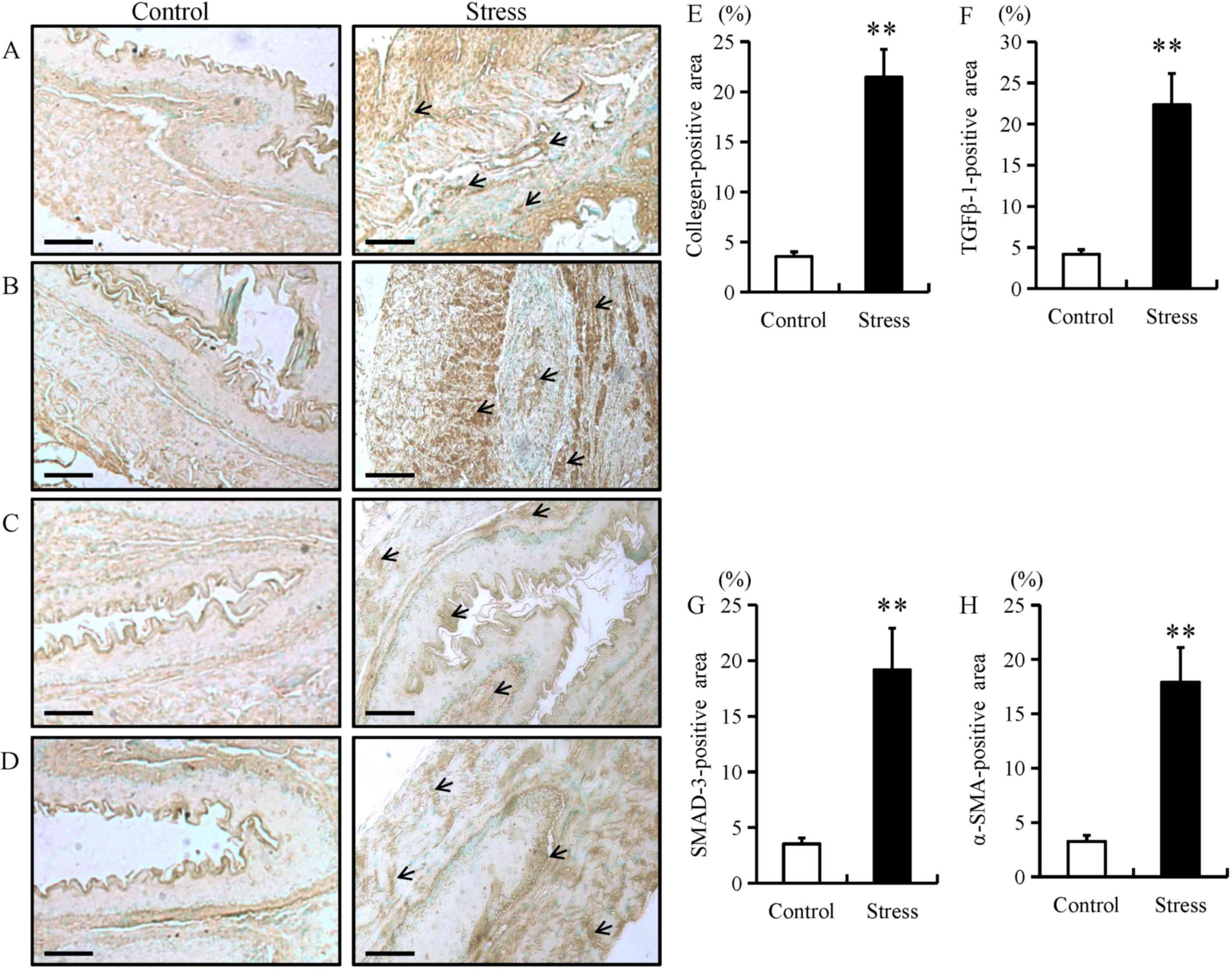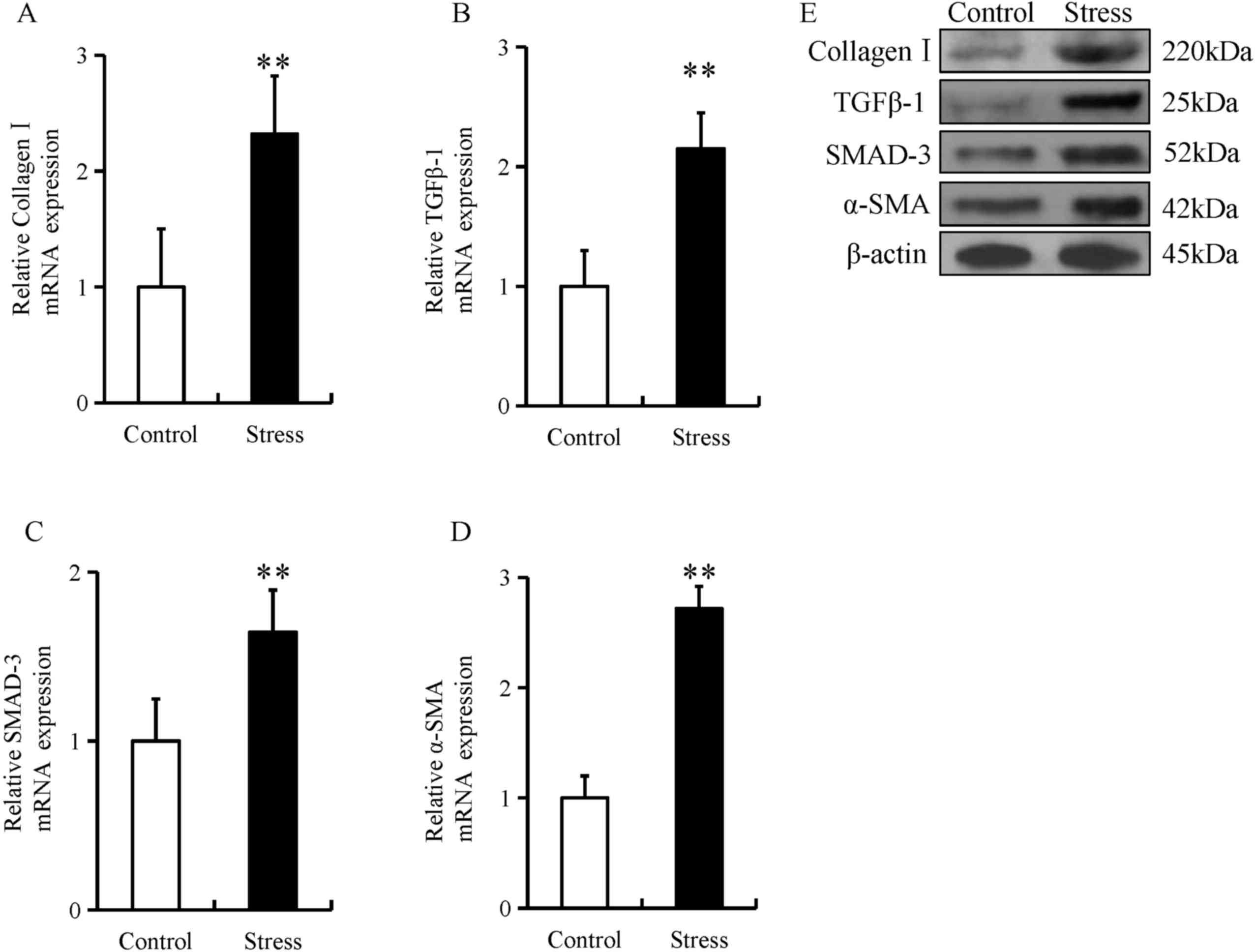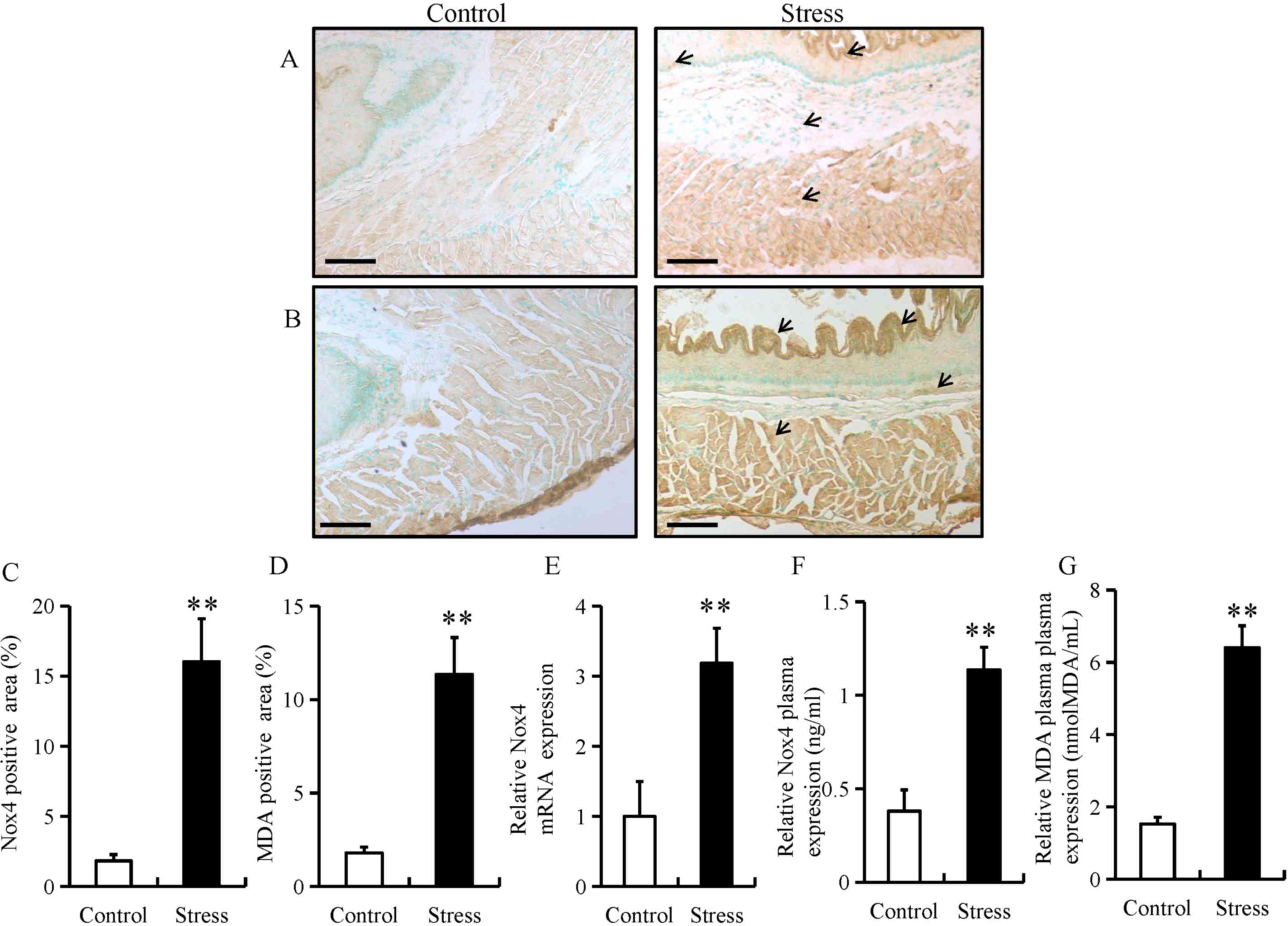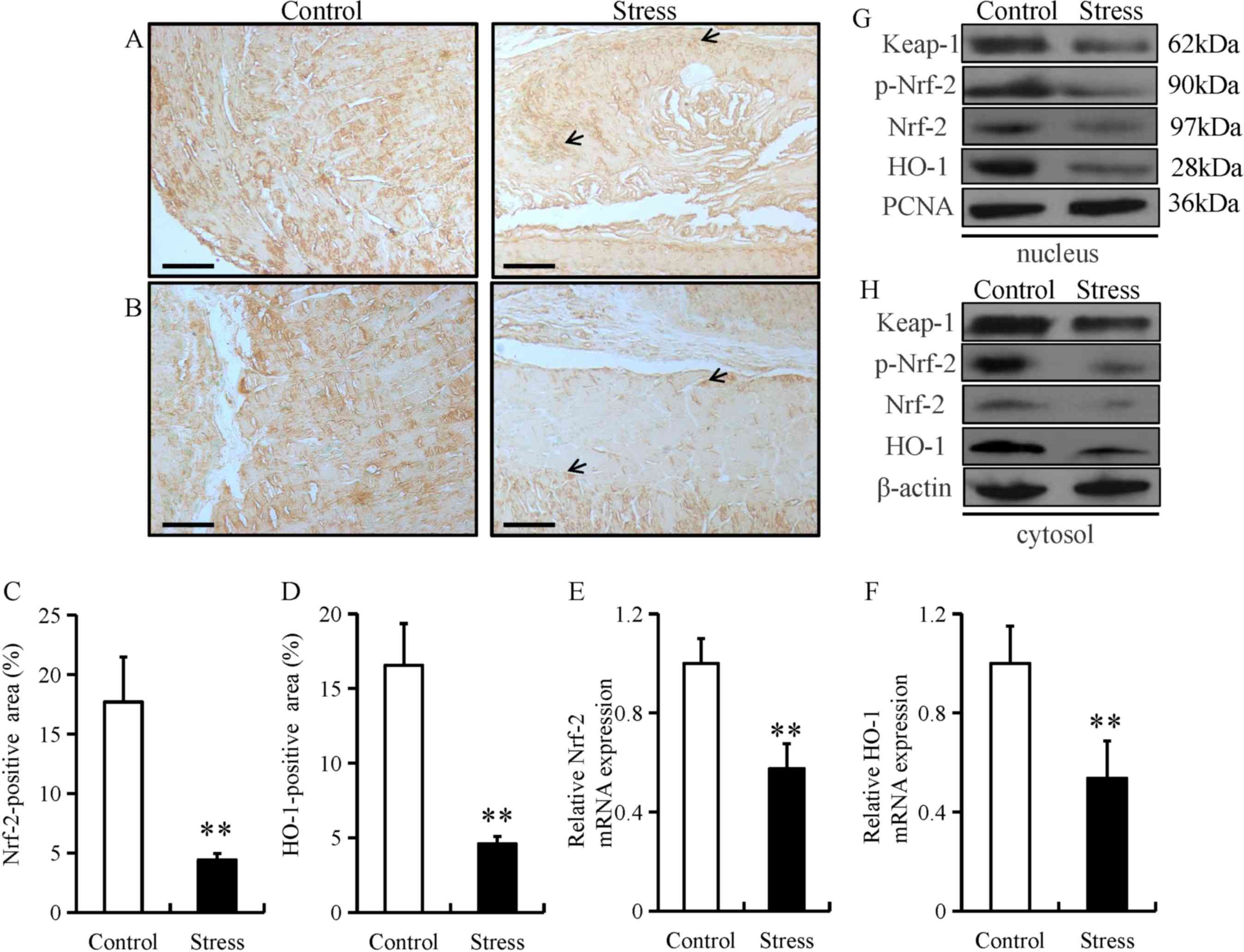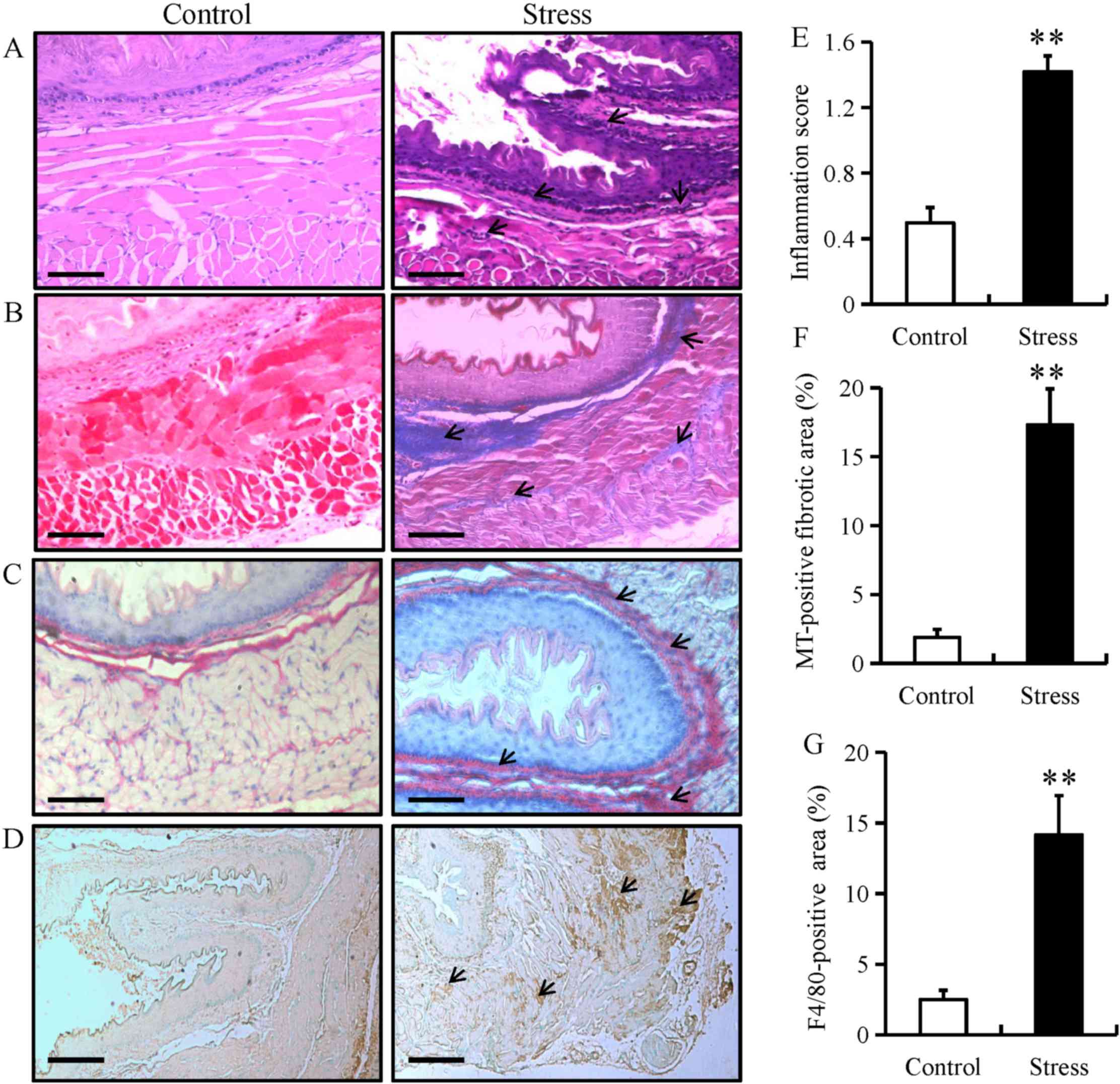|
1
|
Godoy LD, Rossignoli MT, Delfino-Pereira
P, Garcia-Cairasco N and de Lima Umeoka EH: A comprehensive
overview on stress neurobiology: Basic concepts and clinical
implications. Front Behav Neurosci. 12:1272018. View Article : Google Scholar : PubMed/NCBI
|
|
2
|
Liu YZ, Wang YX and Jiang CL:
Inflammation: The common pathway of stress-related diseases. Front
Hum Neurosci. 11:3162017. View Article : Google Scholar : PubMed/NCBI
|
|
3
|
Lucca G, Comim CM, Valvassori SS, Reus GZ,
Vuolo F, Petronilho F, Dal-Pizzol F, Gavioli EC and Quevedo J:
Effects of chronic mild stress on the oxidative parameters in the
rat brain. Neurochem Int. 54:358–362. 2009. View Article : Google Scholar : PubMed/NCBI
|
|
4
|
Tomanek L: Proteomic responses to
environmentally induced oxidative stress. J Exp Biol.
218:1867–1879. 2015. View Article : Google Scholar : PubMed/NCBI
|
|
5
|
Gutierrez J, Ballinger SW, Darley-Usmar VM
and Landar A: Free radicals, mitochondria, and oxidized lipids: The
emerging role in signal transduction in vascular cells. Circ Res.
99:924–932. 2006. View Article : Google Scholar : PubMed/NCBI
|
|
6
|
Zafir A and Banu N: Modulation of in vivo
oxidative status by exogenous corticosterone and restraint stress
in rats. Stress. 12:167–177. 2009. View Article : Google Scholar : PubMed/NCBI
|
|
7
|
Gumuslu S, Sarikçioğlu SB, Sahin E,
Yargiçoğlu P and Ağar A: Influences of different stress models on
the antioxidant status and lipid peroxidation in rat erythrocytes.
Free Radic Res. 36:1277–1282. 2002. View Article : Google Scholar : PubMed/NCBI
|
|
8
|
Sahin E and Gümüşlü S: Immobilization
stress in rat tissues: Alterations in protein oxidation, lipid
peroxidation and antioxidant defense system. Comp Biochem Physiol C
Toxicol Pharmacol. 144:342–347. 2007. View Article : Google Scholar : PubMed/NCBI
|
|
9
|
Li-Kim-Moy JP, Tobias V, Day AS, Leach S
and Lemberg DA: Esophageal subepithelial fibrosis and hyalinization
are features of eosinophilic esophagitis. J Pediatr Gastroenterol
Nutr. 52:147–153. 2011. View Article : Google Scholar : PubMed/NCBI
|
|
10
|
Linares V, Sánchez DJ, Bellés M, Albina L,
Gómez M and Domingo JL: Pro-oxidant effects in the brain of rats
concurrently exposed to uranium and stress. Toxicology. 236:82–91.
2007. View Article : Google Scholar : PubMed/NCBI
|
|
11
|
Bedard K and Krause KH: The NOX family of
ROS-generating NADPH oxidases: Physiology and pathophysiology.
Physiol Rev. 87:245–313. 2007. View Article : Google Scholar : PubMed/NCBI
|
|
12
|
Babalola O, Mamalis A, Lev-tov H and
Jagdeo J: NADPH oxidase enzymes in skin fibrosis: Molecular targets
and therapeutic agents. Arch Dermatol Res. 306:313–330. 2014.
View Article : Google Scholar : PubMed/NCBI
|
|
13
|
Hecker L, Cheng J and Thannickal VJ:
Targeting NOX enzymes in pulmonary fibrosis. Cell Mol Life Sci.
69:2365–2371. 2012. View Article : Google Scholar : PubMed/NCBI
|
|
14
|
De Minicis S and Brenner DA: NOX in liver
fibrosis. Arch Biochem Biophys. 462:266–272. 2007. View Article : Google Scholar : PubMed/NCBI
|
|
15
|
Pennathur S, Hecker L and Thannickal VJ:
Oxidative Stress and Cardiovascular Fibrosis. Humana Press; pp.
425–441. 2010
|
|
16
|
Holterman CE, Read NC and Kennedy CR: Nox
and renal disease. Clin Sci (Lond). 128:465–481. 2015. View Article : Google Scholar : PubMed/NCBI
|
|
17
|
Yisireyili M, Hayashi M, Wu H, Uchida Y,
Yamamoto K, Kikuchi R, Shoaib Hamrah M, Nakayama T, Wu Cheng X,
Matsushita T, et al: Xanthine oxidase inhibition by febuxostat
attenuates stress-induced hyperuricemia, glucose dysmetabolism and
prothrombotic state in mice. Sci Rep. 7:12662017. View Article : Google Scholar : PubMed/NCBI
|
|
18
|
Yisireyili M, Takeshita K, Hayashi M, Wu
H, Uchida Y, Yamamoto K, Kikuchi R, Hao CN, Nakayama T, Cheng XW,
et al: Dipeptidyl peptidase-IV inhibitor alogliptin improves
stress-induced insulin resistance and prothrombotic state in a
murine model. Psychoneuroendocrinology. 73:186–195. 2016.
View Article : Google Scholar : PubMed/NCBI
|
|
19
|
Li Q, Kong L, Zhang S, Zhong Z, Liu X,
Wang J and Kang J: A novel external esophageal perfusion model for
reflux-associated respiratory symptoms. Pathobiology. 77:163–168.
2010. View Article : Google Scholar : PubMed/NCBI
|
|
20
|
Livak KJ and Schmittgen TD: Analysis of
relative gene expression data using real-time quantitative PCR and
the 2(-Delta Delta C(T)) method. Methods. 25:402–408. 2001.
View Article : Google Scholar : PubMed/NCBI
|
|
21
|
Yisireyili M, Uchida Y, Yamamoto K,
Nakayama T, Cheng XW, Matsushita T, Nakamura S, Murohara T and
Takeshita K: Angiotensin receptor blocker irbesartan reduces
stress-induced intestinal inflammation via AT1a signaling and
ACE2-dependent mechanism in mice. Brain Behav Immun. 69:167–179.
2018. View Article : Google Scholar : PubMed/NCBI
|
|
22
|
Wakabayashi N, Itoh K, Wakabayashi J,
Motohashi H, Noda S, Takahashi S, Imakado S, Kotsuji T, Otsuka F,
Roop DR, et al: Keap1-null mutation leads to postnatal lethality
due to constitutive Nrf2 activation. Nat Genet. 35:238–245. 2003.
View Article : Google Scholar : PubMed/NCBI
|
|
23
|
Torihata Y, Asanuma K, Iijima K, Mikami T,
Hamada S, Asano N, Koike T, Imatani A, Masamune A and Shimosegawa
T: Estrogen-dependent Nrf2 expression protects against
reflux-induced esophagitis. Dig Dis Sci. 63:345–355. 2018.
View Article : Google Scholar : PubMed/NCBI
|
|
24
|
Peng D, Belkhiri A, Hu T, Chaturvedi R,
Asim M, Wilson KT, Zaika A and El-Rifai W: Glutathione peroxidase 7
protects against oxidative DNA damage in oesophageal cells. Gut.
61:1250–1260. 2012. View Article : Google Scholar : PubMed/NCBI
|
|
25
|
Oh TY, Lee JS, Ahn BO, Cho H, Kim WB, Kim
YB, Surh YJ, Cho SW and Hahm KB: Oxidative damages are critical in
pathogenesis of reflux esophagitis: Implication of antioxidantsin
its treatment. Free Radic Biol Med. 30:905–915. 2001. View Article : Google Scholar : PubMed/NCBI
|
|
26
|
Aceves SS: Remodeling and fibrosis in
chronic eosinophil inflammation. Dig Dis. 32:15–21. 2014.
View Article : Google Scholar : PubMed/NCBI
|
|
27
|
Wynn TA and Ramalingam TR: Mechanisms of
fibrosis: Therapeutic Translation for fibrotic disease. Nat Med.
18:1028–1040. 2012. View
Article : Google Scholar : PubMed/NCBI
|
|
28
|
Sziksz E, Pap D, Lippai R, Béres NJ,
Fekete A, Szabó AJ and Vannay Á: Fibrosis related inflammatory
mediators: Role of the IL-10 cytokine family. Mediators Inflamm.
2015:7646412015. View Article : Google Scholar : PubMed/NCBI
|
|
29
|
Miller MW and Sadeh N: Traumatic stress,
oxidative stress and post-traumatic stress disorder:
Neurodegeneration and the accelerated-aging hypothesis. Mol
Psychiatry. 19:1156–1162. 2014. View Article : Google Scholar : PubMed/NCBI
|
|
30
|
Frangogiannis NG: Fibroblast-extracellular
matrix interactions in tissue fibrosis. Curr Pathobiol Rep.
4:11–18. 2016. View Article : Google Scholar : PubMed/NCBI
|
|
31
|
Hosper NA, van den Berg PP, de Rond S,
Popa ER, Wilmer MJ, Masereeuw R and Bank RA:
Epithelial-to-mesenchymal transition in fibrosis: Collagen type I
expression is highly upregulated after EMT, but does not contribute
to collagen deposition. Exp Cell Res. 319:3000–3009. 2013.
View Article : Google Scholar : PubMed/NCBI
|
|
32
|
Hinz B, McCulloch CA and Coelho NM:
Mechanical regulation of myofibroblast phenoconversion and collagen
contraction. Exp Cell Res. 379:119–128. 2019. View Article : Google Scholar : PubMed/NCBI
|
|
33
|
Song JH, Han YM, Kim WH, Park JM, Jeong M,
Go EJ, Hong SP and Hahm KB: Oxidative stress from reflux
esophagitis to esophageal cancer; the alleviation with
antioxidants. Free Radic Res. 50:1071–1079. 2016. View Article : Google Scholar : PubMed/NCBI
|
|
34
|
Dandekar A, Mendez R and Zhang K: Cross
talk between ER stress, oxidative stress, and inflammation in
health and disease. Methods Mol Biol. 1292:205–214. 2015.
View Article : Google Scholar : PubMed/NCBI
|
|
35
|
Maqbool A and Pauwels A: Cystic fibrosis
and gastroesophageal reflux disease. J Cyst Fibros 2 (16 Suppl).
S2–S13. 2017. View Article : Google Scholar
|
|
36
|
Jaramillo MC and Zhang DD: The emerging
role of the Nrf2-Keap1 signaling pathway in cancer. Genes Dev.
27:2179–2191. 2013. View Article : Google Scholar : PubMed/NCBI
|
|
37
|
Chen H, Fang Y, Li W, Orlando RC, Shaheen
N and Chen XL: NFkB and Nrf2 in esophageal epithelial barrier
function. Tissue Barriers. 1:e274632013. View Article : Google Scholar : PubMed/NCBI
|
|
38
|
Chen H, Hu Y, Fang Y, Djukic Z, Yamamoto
M, Shaheen NJ, Orlando RC and Chen X: Nrf2 deficiency impairs the
barrier function of mouse oesophageal epithelium. Gut. 63:711–719.
2014. View Article : Google Scholar : PubMed/NCBI
|
|
39
|
Balta C, Herman H, Boldura OM, Gasca I,
Rosu M, Ardelean A and Hermenean A: Chrysin attenuates liver
fibrosis and hepatic stellate cell activation through TGF-β/Smad
signalingpathway. Chem Biol Interact. 240:94–101. 2015. View Article : Google Scholar : PubMed/NCBI
|
|
40
|
Kuppan P, Sethuraman S and Krishnan UM: In
vitro co-culture of epithelial cells and smooth muscle cells on
aligned nanofibrous scaffolds. Mater Sci Eng C Mater Biol Appl.
81:191–205. 2017. View Article : Google Scholar : PubMed/NCBI
|
|
41
|
Ghosh AK, Bhattacharyya S and Varga J: The
tumor suppressor p53 abrogates Smad-dependent collagen gene
induction in mesenchymal cells. J Biol Chem. 279:47455–47463. 2004.
View Article : Google Scholar : PubMed/NCBI
|
|
42
|
Ito S, Ogawa K, Takeuchi K, Takagi M,
Yoshida M, Hirokawa T, Hirayama S, Shin-Ya K, Shimada I, Doi T, et
al: A small-molecule compound inhibits a collagen-specific
molecular chaperone and could represent a potential remedy for
fibrosis. J Biol Chem. 292:20076–20085. 2017. View Article : Google Scholar : PubMed/NCBI
|
|
43
|
Hu Z, Robbins JS, Pister A, Zafar MB,
Zhang ZW, Gupta J, Lee KJ, Newman K, Yun CO, Guise T and Seth P: A
modified hTERT promoter-directed oncolytic adenovirus replication
with concurrent inhibition of TGFbeta signaling for breast cancer
therapy. Cancer Gene Ther. 17:235–243. 2010. View Article : Google Scholar : PubMed/NCBI
|
|
44
|
Cho JY, Doshi A, Rosenthal P, Beppu A,
Miller M, Aceves S and Broide D: Smad3-deficient mice have reduced
esophageal fibrosis and angiogenesis in model of egg-induced
eosinophilic esophagitis. J Pediatr Gastroenterol Nutr. 59:10–16.
2014. View Article : Google Scholar : PubMed/NCBI
|















